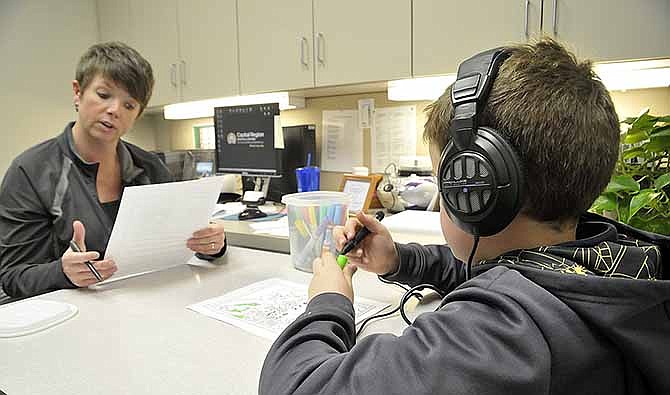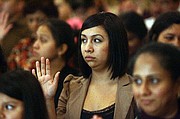Liam O'Brien had always been ahead of the curve.
Teachers called him a thinker, and considered him analytical.
"We were used to him really excelling at school and being at the forefront of the pack," said Kim O'Brien, Liam's mother. "That was from preschool all the way to the second grade. Then it was almost like he just crashed in the second grade."
Liam was experiencing what 5 percent of school-aged children face - a disorder where they can't process what they hear.
Kim said she and her husband began to see a trend in Liam not finishing his school work. He would hand in assignments with blanks.
"He was struggling and was upset," Kim said. "We couldn't figure it out. It was the first time ever that we heard him say he doesn't like school, that he doesn't want to go to school."
Liam, his parents and his teacher were frustrated.
His teacher suggested Liam have his hearing tested, and the results came back fine.
"So, we fumbled along," Kim said.
Last summer, Liam took an IQ test to see if he was eligible for Jefferson City Public Schools' Explore, Enrich, Research program for gifted students. He scored high in every category except cognitive processing.
In response, his pediatrician questioned attention deficit disorder (ADD).
A pediatrician friend of the family didn't think ADD seemed right. She suggested the O'Briens have Liam tested for auditory processing disorder (APD) at the Missouri School for the Deaf.
His test results came out positive.
"We went and visited with the audiologist at the Missouri School for the Deaf and learned about this disorder," Kim said. "For Liam, whenever there is background noise, and it doesn't even have to be loud background noise, his ears are picking that up at the same caliber that the teacher is talking."
Alison Burco, the audiologist at the Missouri School for the Deaf, said APD is when someone cannot understand, comprehend or sometimes even recognize complex sounds and can't hear the difference between them.
"It's not associated with any sort of hearing loss or any sort of intellectual ability," she said. "It's like they have normal hearing, but they hear like they have hearing loss. Somewhere along the line there's a breakdown."
She said it's often misdiagnosed as ADD.
"Kids who have ADD are generally inattentive and kids with APD are inattentive when the noise is there," Burco said.
Nine-year-old Liam now attends therapy once a week with a speech-language pathologist at Capital Region Medical Center. He's also experienced changes at his school, Immaculate Conception, to help him hear and process what his third-grade teacher says.
One tool is an FM transmitter. His teacher wears a microphone, and Liam wears earbuds in his ears that transmit his teacher's voice.
"There are other things that I already did, such as curtains, carpets and bookshelves as sound buffers," said Bonnie Keilholz, Liam's teacher.
Liam also has homework to do with his parents to work on auditory processing. He chooses the background noise and then his parents give him multiple tasks and instructions.
Kim said Liam's grades have already shown remarkable improvement, but not overnight. He'll be re-evaluated this month.
"I was so scared at the beginning, but I think it's been in a strange way, a blessing that he can be helped," Kim said. "This is not a death sentence. It's not that he is going to need special treatment in his life. It can be resolved and turned around, and I'm very grateful for that."
Burco said awareness is helping diagnose the disorder. When one kid is diagnosed, she'll get a handful of referrals to test friends and classmates.
She said signs of APD can include difficulty following multi-step directions, as well as difficulty with background noise, short-term memory, reading, spelling and writing.
"A lot of kids are easily distracted," she said. "Also, APD kids are classically the ones who at the end of the day are super tired. They've just worked so hard during the day that they come home (from school) and they crash."
She encourages parents who are unsure to have their kids tested for APD. Testing is free at the Missouri School for the Deaf.
"I'd rather test 1 million kids that are normal than miss the one that I didn't test because the parents didn't bring them in," Burco said. "When in doubt, do it."
She said the disorder is not the end of the world.
"They can do a lot of stuff to make it better and improve," she said. "It's going to make a huge difference in a child's life."


